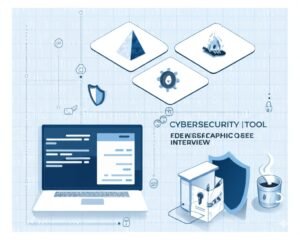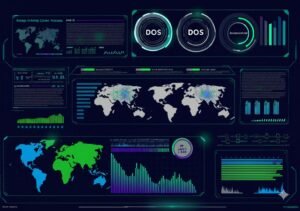Preparing for a cybersecurity interview can feel like gearing up for a big game. The nerves, the excitement, and the pressure to perform at your best can sometimes seem overwhelming. But here’s the thing: With the right preparation, you can turn those nerves into confidence and make sure you’re ready to tackle anything that comes your way. I know this from personal experience – I’ve been on both sides of the table, as an interviewer and as someone looking for a job. So, let’s break it down and make the process as smooth as possible.
Research the Company’s Cybersecurity Practices and Culture
Before diving into the technical stuff, you need to know who you’re interviewing. By that, I mean understanding the company’s cybersecurity approach and values. It’s like when you’re going to a party; you want to know the vibe before you show up, right? Do they prioritize proactive security measures, or are they more reactive? What tools and practices are they using? Do some homework on the company’s security policies.
Here’s a tip: Take a look at their website, blog posts, and even news articles related to their cybersecurity initiatives. If they have a team dedicated to cybersecurity, check out their LinkedIn profiles and see what kind of projects they’re working on. This not only helps you align your skills with their needs but also shows your interest in the company, which is always a plus during interviews.

Company Research Checklist
| Research Focus | How to Gather Info |
|---|---|
| Cybersecurity Tools | Check their website and tech blogs. |
| Security Practices | Read about past security incidents or audits. |
| Team Structure | Look at team members’ profiles on LinkedIn. |
Brush Up on Essential Technical Skills
When it comes to cybersecurity, technical knowledge is your bread and butter. But let’s be real—sometimes it can feel like you’re drowning in acronyms and protocols. The key is to focus on the fundamentals that are commonly asked in interviews.
I remember stressing out before an interview, thinking I had to memorize every tool I’d ever used. But I quickly realized that employers just want to see that you understand core concepts like malware, encryption, and firewalls. If you can confidently explain what a firewall does or describe how ransomware spreads, you’re on the right track.
Here are a few essential topics to cover:
- Networking basics: Understand how different protocols work and their security implications.
- Malware, Ransomware, and Viruses: Be able to explain what each is and how to prevent them.
- Encryption and Data Protection: These are often critical in cybersecurity roles, especially in organizations handling sensitive information.
A practical way to prepare is by revisiting your past experiences or completing some hands-on exercises. I personally used platforms like Hack The Box and Codecademy to sharpen my skills before interviews. These platforms simulate real-world scenarios, which gives you a good feel of what might be asked in technical interviews.
Key Technical Areas to Review
| Topic | Why It’s Important |
|---|---|
| Networking Protocols | Fundamental for understanding how to secure networks. |
| Malware & Ransomware | You’ll face questions about these in almost every interview. |
| Data Protection | Encryption and privacy are critical in every cybersecurity role. |
Prepare for Behavioral and Situational Interview Questions
Okay, now that you’ve got the technical skills down, it’s time to tackle the soft skills. Cybersecurity is not just about defending systems; it’s also about being a good problem solver and communicator. I know it’s easy to focus solely on the technical aspects, but trust me, interviewers will want to know about your approach to challenges, teamwork, and decision-making.
Behavioral questions are designed to understand how you’ve handled situations in the past and how you might handle them in the future. One of the most popular ways to answer these is through the STAR method (Situation, Task, Action, Result).
For example:
- Question: “Tell me about a time when you handled a security breach.”
- Answer: (Using STAR) “In my previous job (Situation), we noticed an unusual traffic spike (Task). I immediately checked our firewall logs and identified a potential DoS attack (Action). We implemented countermeasures, and the attack was blocked within minutes, preventing any downtime (Result).”
Prepare by reflecting on your past experiences and being ready to discuss specific examples where you’ve resolved security issues or worked with teams to address vulnerabilities. It’s not just about technical skill—it’s about demonstrating problem-solving and teamwork.
Stay Updated on the Latest Trends and Emerging Threats
Cybersecurity is a rapidly evolving field. If you’re not staying updated, you’re falling behind. I’ve had interviews where the hiring manager asked me about emerging threats like AI-based attacks or cloud security vulnerabilities. And to be honest, if I hadn’t kept up with trends, I would’ve been in trouble.
You should be aware of topics like:
- AI in Cybersecurity: AI is being used both for defense and for launching attacks. Understanding its role in cybersecurity can set you apart.
- Cloud Security: As more companies shift to the cloud, cloud security has become a hot topic. Be sure you understand the risks and protections associated with cloud platforms.
- Zero-Day Vulnerabilities: These are flaws that hackers exploit before they’re known to the public or patched by companies.
To stay informed, follow industry blogs, listen to podcasts, and attend webinars. Platforms like Coursera and Simplilearn are also great resources for continuous learning.
Review Common Cybersecurity Interview Questions
It’s always good to know what you’re walking into. Here are some of the most common questions asked in cybersecurity interviews:
- What is cybersecurity, and why is it important?
- This is a straightforward but important question. Keep your answer simple and focus on the value of protecting information in today’s digital world.
- What’s the difference between a threat, vulnerability, and risk?
- Be clear about how each one differs and how they impact the security landscape.
- How do you handle a security breach?
- This could involve anything from identifying the breach to mitigating damage and communicating with stakeholders.
Prepare by reviewing typical questions and practicing your responses out loud. If you can, record yourself to see how you come across.
Ask the Right Questions During the Interview
Now, interviews aren’t just for the employer to learn about you; it’s your chance to learn about them. When you ask insightful questions, it shows you’re serious about the role. A few questions I always recommend asking:
- “What are the biggest cybersecurity challenges the team is currently facing?”
- “How do you measure the success of your cybersecurity efforts?”
- “Can you describe how the cybersecurity team collaborates with other departments?”
These questions not only provide you with valuable information but also demonstrate your proactive approach and genuine interest in the role.
Final Preparations and Mindset Before the Interview
In the days leading up to your interview, practice makes perfect. Rehearse your answers, do mock interviews, and make sure you’re comfortable discussing both technical and behavioral topics. But don’t stress too much. Just like anything, the more you practice, the more natural it will feel.
And don’t forget to get enough sleep before the interview day—your brain needs fuel to function at its best!
FAQs
1. How do I prepare for a cybersecurity interview?
Research the company, brush up on your technical skills, and practice both technical and behavioral questions.
2. What are the most common cybersecurity interview questions?
Expect questions about your experience with malware, firewalls, encryption, and specific security incidents you’ve managed.
3. What technical skills should I focus on for a cybersecurity interview?
Focus on networking, malware types, data protection, and incident response.
4. How can I stay updated on cybersecurity trends?
Follow industry blogs, listen to cybersecurity podcasts, and take courses on platforms like Coursera or Codecademy.
5. What is the STAR method in interviews?
The STAR method stands for Situation, Task, Action, Result. It’s a way to structure answers to behavioral questions.
6. How should I handle a cybersecurity breach in an interview scenario?
Discuss your step-by-step approach to identifying, mitigating, and communicating the breach while following company protocols.
7. What are some good questions to ask during a cybersecurity interview?
Ask about the biggest challenges the cybersecurity team is facing and how they measure success.



